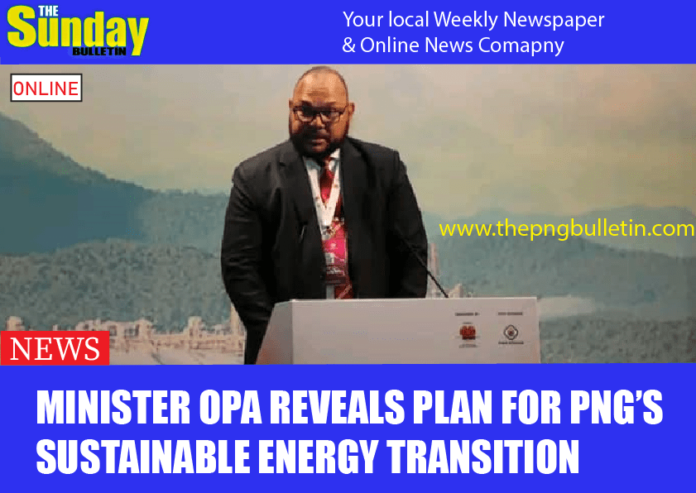MINISTER for Energy, Hon. Thomas Opa, has outlined the importance of shifting toward a diversified energy portfolio, which includes renewable energy sources, to meet the nation’s growing energy demands while reducing its carbon footprint.
He said this during his keynote address today at the 24th Petroleum and Energy Conference (#PEC24) this morning.
“This moment presents us with both a challenge and an extraordinary opportunity to redefine our petroleum and energy landscape for the benefit of our economy, our environment, and our people,” Opa said.
He stated the critical global shift toward sustainability, noting that worldwide electricity generation is projected to reach 28.81 trillion kWh by 2024, with an annual growth rate of 2.52% through 2029.
With climate change, global conflicts, and the aftermath of the pandemic as key drivers for change, Opa emphasized Papua New Guinea’s strategic position as a resource-rich nation capable of leading the energy transition.
“As a nation rich in natural resources, Papua New Guinea has a vital role to play in this global transition, and our decisions today will echo for generations,” he said.
He stressed the need for a balanced energy mix that includes renewables like solar, hydro, wind, and geothermal energy, which Papua New Guinea has in abundance.
Minister Opa outlined the significant potential of renewable energy, with global investments in clean energy reaching $619 billion in 2023, and the market projected to surpass $2 trillion by 2025.
“By investing in these areas, we can create a balanced energy mix that meets our growing needs while reducing our carbon footprint,” he said.
Opa also stress the importance of cutting-edge technologies such as carbon capture, hydrogen production, and electrification to ensure the energy transition is both efficient and sustainable.
He announced progress in regulatory reforms aimed at encouraging investments in renewable energy projects while holding petroleum companies accountable for environmental stewardship.
Notably, three licenses were issued to Namatanai District, Kikori District, and Niu Power, signaling a shift towards power liberation and regulatory improvements in the energy sector.
“We are keen to ensure that the electricity market is deregulated to a point where competition and energy access fully serve our aspirations as a country for economic development,” he added.
Opa added by calling for collaboration between government, industry leaders, and international partners, underscoring the need for coordinated efforts to ensure a successful transition.
“Let us work hand in hand, united by a vision of a cleaner, greener, and more resilient Papua New Guinea.

